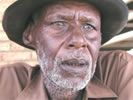Eye For Film >> Movies >> Keepers Of Memory (2004) Film Review
The scale of the Rwandan genocide of 1994 is incredibly difficult to wrap your brain around. It is estimated that more than one million people lost their lives in just three months. To give it some perspective, this is the equivalent of the entire population of Edinburgh and Glasgow combined being slaughtered simply because of their racial background.
The massacre of the Tutsi by Hutu militia the Interahamwe became a stain on the international community's conscience, since the West was at least partially culpable thanks to pulling its troops out of the country and letting the bloodshed commence. And, as the 10-year anniversary rolled around several filmmakers sought to address the horrific events through fact-based fiction - Shooting Dogs, Hotel Rwanda - and through documentary - Shake Hands With The Devil, Triage. This film was made in the anniversary year and differs from the other documentaries on the subject in that it offers a uniquely Rwandan perspective on the aftermath of the slaughter.

Director Eric Kabera is better placed than most to examine the genocide, he is a Tutsi himself and lost many members of his own family in those fateful three months. He went on to make both the fictional feature 100 Days and this moving and disturbing documentary, examining how - and if - it is possible for a nation to come to terms with murder on such a massive scale.
Near the beginning of the film, which features testimony from both the surviving victims and the perpetrators, one woman who lost her family says: "I am not only crying now, I'm crying all the time." It is this spirit of desolation which pervades the whole film. Several of those who lost entire clans - one man here says he stopped counting those he knew who had died when he reached 146 - speak about their grief and its clear to see they are still (and possibly always will be) grappling with the trauma. Meanwhile those who joined in the killings talk matter of factly about those they murdered - as if it was another lifetime away.
Kabera sets the scene using archive footage - bleached out to help the audience distinguish between it and the present testimony - but it would help to know at least something about the events of 1994 before you watch this, since his focus is firmly on the aftermath not the event (although there are a handful of shocking images of the violence). What is perhaps most shocking about the footage here, is the number of bodies that were still being found, a decade on, as families are forced again to come to terms with the enormity of what has been lost. His camera captures the contrast between the peaceful greenery of the country and the seemingly endless rooms of skeletons and bones that stand as memorials to those who lost their lives.
The overwhelming mood is not one of vengeance, although it is mentioned in passing by some, but of lingering trauma of a people who struggling to move on while carrying the memories of their loved ones with them. There is talk of "forgiving but not forgetting". It's vitally important that Rwandans aren't the only ones who remember these events and recall what can happen when the worldwide community washes its hands of a situation - particularly given the current plight of many in Darfur.
Reviewed on: 17 Oct 2009


















